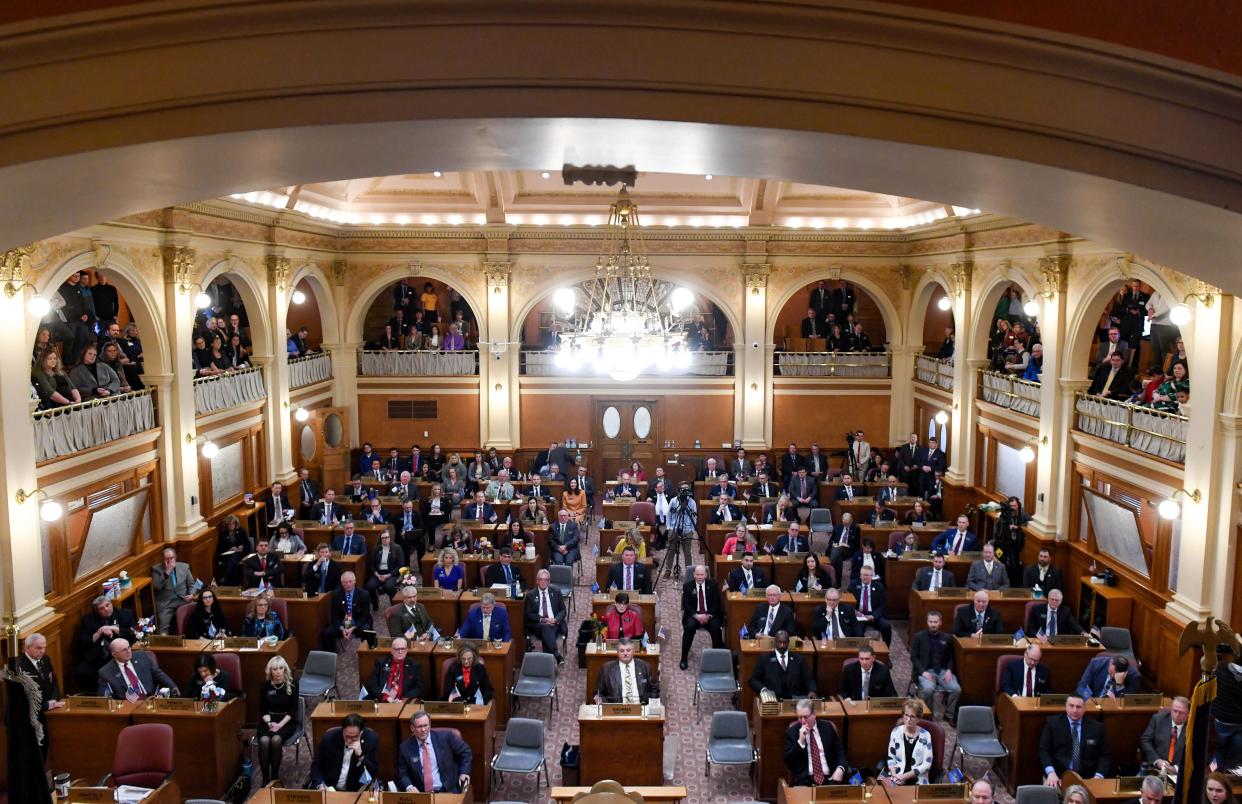Legislature sustains Gov. Kristi Noem's vetoes

- Oops!Something went wrong.Please try again later.
PIERRE — Lawmakers voted to agree with the veto of four bills Monday as the final act of the 98th Legislative session.
Included in that was a bill to update the definition of money to include cryptocurrency, something that became a hot topic in the last few weeks of session.
Other bills varied in topics like updating the limit of THC found in raw hemp product, updating assault provisions for teachers and if college students under the age of 21 should be allowed to taste alcohol as part of classes on brewing.
Noem had vetoed the four bills after they had passed out of the House of Representatives and Senate during the regular session.
More:Interest groups spend thousands on social events for lawmakers, with no disclosure
Why was the UCC so controversial?
At its most basic, the Uniform Commercial Code is a law that all 50 states have some form of to regulate commercial transactions.
The last time the UCC was updated was in 2012 and because of advancements in digital banking, the newest draft includes adding cryptocurrency to the definition of money.
This is where the South Dakota Freedom Caucus took issue and started lobbying against the bill, arguing it would open the door for the federal government to establish a central banking digital currency (CBDC) and stifle competition between cryptocurrency services.
"There's just the overall control at the federal government having such a stronghold on cryptocurrency that what it does is it starts to stifle out all these other cryptocurrencies," said Rep. Aaron Aylward, R-Harrisburg, chairman of the SD Freedom Caucus.
More:T. Denny Sanford attorneys argue to keep affidavits sealed in South Dakota Supreme Court
Yankton Rep. Julie Auch said the bill would govern private commercial transactions and personal transactions.
"These state laws govern you and your constituents financial dealings, their bank accounts mortgages and business financial activity," she said during debate.
Rep. Scott Odenbach, R-Spearfish, spoke about how Florida Gov. Ron DeSantis was supporting legislation in his state's legislature to ban the use of a federally-adopted CBCD within Florida and other foreign CBCD.
"I just think this is something that's important," Odenbach said. "It needs another year to get it right."
Hemp, teacher assault provisions, 'sip-n-spit' not approved
Lawmakers also voted to sustain Noem's veto of HB 1209, would allow state licensed industrial processors to accept raw hemp containing up to 5% delta-9 tetrahydrocannabinol, or THC, which is the psychoactive component found in both hemp and cannabis.
Rep. Oren Lesmeister, D-Parade, who sponsored the bill, said it targeted raw CBD oil that could contain up to 5% THC when it left the field. But once the oil was processed, it had to go back down to the acceptable .03% in line with the Department of Agriculture.
"We're not putting products out on the shelf at 5%," he said.
More:South Dakota Gov. Kristi Noem vetoes hemp bill in blow to flourishing new industry
Rep. Mary Fitzgerald, R-Saint Onge, argued that by changing the hemp statute, it could equate hemp with marijuana, which is illegal federally and in South Dakota.
"There are only two states in the United States that allow a product in process to contain up to 5% THC, and that's that pesky Colorado and the state of New York," she said. "And both of those states have legalized recreational marijuana."
In the Senate, bills that would've created an enhanced criminal penalty for assaulting teachers and allowed students under 21 to taste alcohol as part of a brewing class, had their vetoes sustained.
SB 129 would've treated teachers like law enforcement officers when assaulted by a student. In her veto letter, Noem wrote the bill could open the door for other occupations to receive special treatment.
"South Dakota already has a strong and fair criminal justice system, and the school districts have robust disciplinary policies tailored to address behavior within their districts," Noem said.
More:Report: Sioux Falls needs more mental health providers, education on existing resources
Noem was against SB 108 because in her view it would've legalized underage drinking in college courses.
"“[The] flawed language creates potential loopholes that pose problems for law enforcement,” Noem wrote in her letter. “Officers encountering underage students with alcohol on their breath or in their system must determine if this exception to underage drinking law applies before writing a citation. We should respect the work of law enforcement by not needlessly making their jobs any tougher.”
Total bill score: 209 bills signed, 5 bills vetoed
Previously the legislature was unable to override a veto on updating the tax hotels are allowed to charge per night, currently set at a rate of $2.
Before veto day, 209 bills had been signed. A majority of those will go into effect on July 1.
This article originally appeared on Sioux Falls Argus Leader: Legislature sustains Gov. Kristi Noem's vetoes

